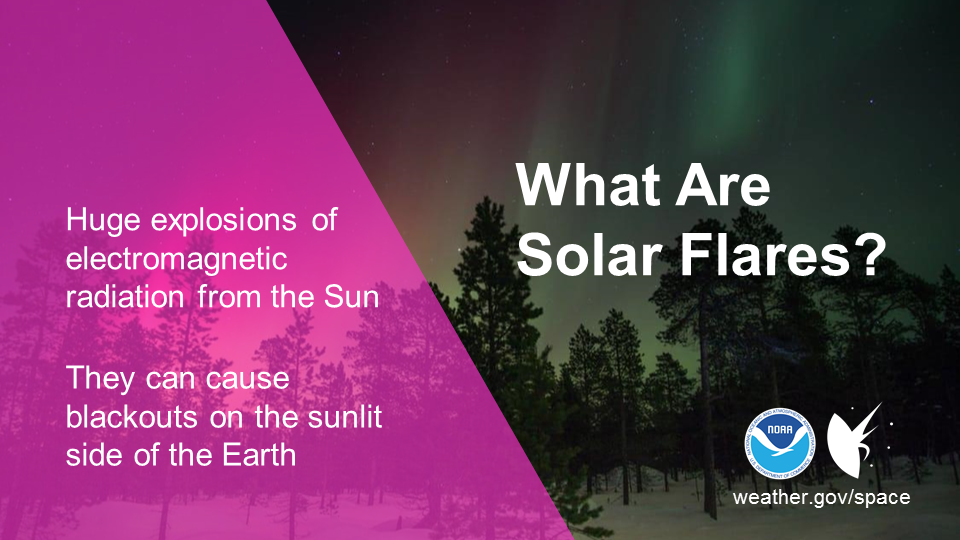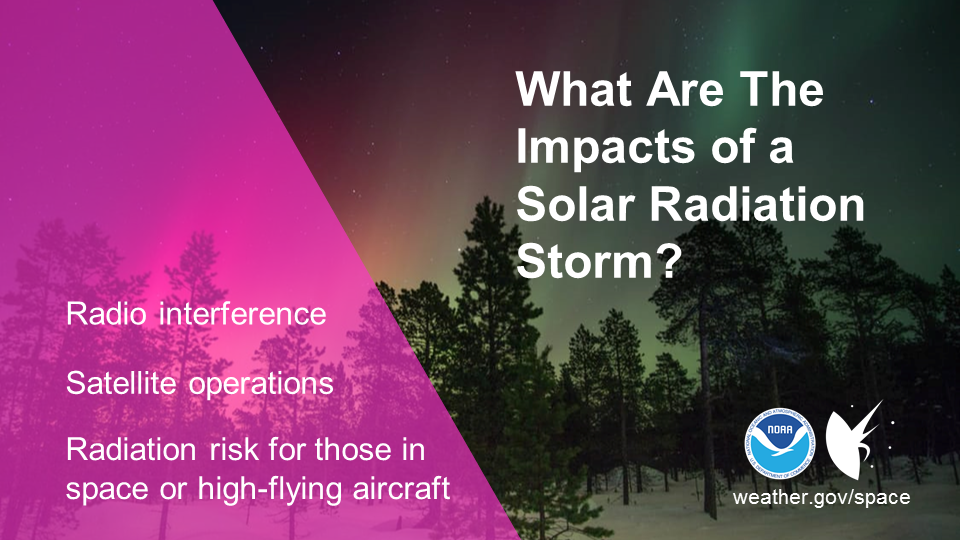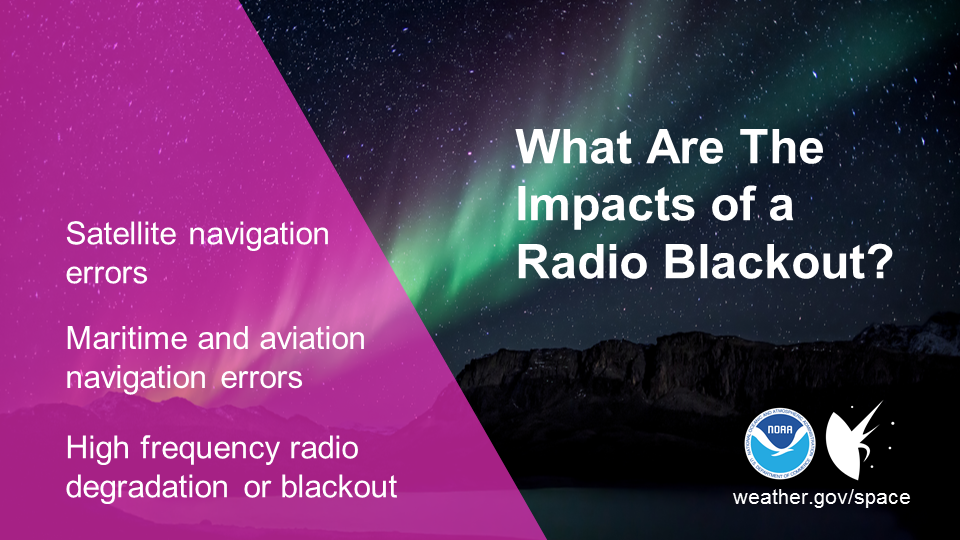Please help the National Weather Service spread these important safety messages on social media! Everyone is welcome to use the text and images provided below to help the NWS build a Weather-Ready Nation.
Facebook
In 1989, a powerful storm triggered a major power blackout in Canada that left 6 million people without electricity for 9 hours. That storm came from space. Watch this video to learn about the impacts of space weather - https://youtu.be/gN3aP6Vr6H8
Twitter
In 1989, a powerful storm triggered a major power blackout in Canada that left 6 million people without electricity for 9 hours. That storm came from space. Watch this video to learn about the impacts of #spaceweather - https://youtu.be/gN3aP6Vr6H8
Facebook
The aurora borealis is usually green, although it can also appear to be a range of other colors, including red, blue, pink and purple. The color of the aurora is determined by the altitude in which it appears. Different atmospheric compounds (such as Nitrogen and Oxygen) are found at different altitudes. When charged particles from the Sun enter our atmosphere, they interact with those compounds, and the aurora is the visible result. Depending on which compounds are being excited by the Sun’s charged particles, different colors will result. Learn more at pwg.gsfc.nasa.gov/polar/telecons/archive/PR_E-PO/Aurora_flyer/aurora-flyer_p2.doc.pdf
Twitter
Red, Green, Blue? Why does the Aurora change colors? Chemistry! pwg.gsfc.nasa.gov/polar/telecons/archive/PR_E-PO/Aurora_flyer/aurora-flyer_p2.doc.pdf #SpaceWeather

Facebook
Effective communication systems are critical. Aviation and emergency response communities depend on reliable communications. Radio and satellite communication technologies can experience significant degradation from space weather storms. To learn about space weather impacts, visit swpc.noaa.gov/impacts/hf-radio-communications and swpc.noaa.gov/impacts/satellite-communications
Twitter
Communications systems are critical and can be vulnerable to the Sun! swpc.noaa.gov/impacts/hf-radio-communications and swpc.noaa.gov/impacts/satellite-communications #spaceweather

Facebook
Although the Earth’s magnetosphere, ionosphere, and atmosphere do a great job protecting us from hazardous space weather, it is still possible for space weather to cause power outages. Find out more about space weather impacts at swpc.noaa.gov/impacts/electric-power-transmission.
Twitter
The Sun is the main source of space weather. It can even cause power outages! Find out more at swpc.noaa.gov/impacts/electric-power-transmission #SpaceWeather

Facebook
The Aurora Borealis (Northern Lights) are the result of electrons colliding with the Earth’s upper atmosphere, and are visible when there is an increase in space weather activity. They can be observed in dark and clear areas of North America, Asia, and Europe. To learn more about auroras and other space weather phenomena, visit swpc.noaa.gov/phenomena/aurora.
Twitter
The Northern Lights are visible when there is an increase is space weather activity. Check out swpc.noaa.gov/phenomena/aurora. #SpaceWeather

Facebook
Solar flares are huge explosions of electromagnetic radiation from the Sun, lasting from minutes to hours. They are seen as enhancements in optical and extreme ultraviolet/x-ray wavelengths, and can be detected as bursts of noise in radio wavelengths. Solar flares occur in a large range of strengths, have emissions that travel at the speed of light, and reach Earth in eight minutes. They can cause radio blackouts on the sunlit side of the Earth. To learn about radio blackouts, visit swpc.noaa.gov/phenomena/solar-flares-radio-blackouts.
Twitter
Solar flares are energetic explosions from the Sun & can cause radio blackouts from minutes to hours. swpc.noaa.gov/phenomena/solar-flares-radio-blackouts #SpaceWeather

Facebook
Coronal Mass Ejections (CMEs), are explosive eruptions of plasma from the Sun’s outer atmosphere, the Corona. A CME typically carries roughly a billion tons of material outward from the Sun at speeds that can reach millions of miles per hour. CMEs may take hours to fully erupt from the Sun, and typically take one to four days to travel to Earth. When a CME arrives at Earth, it can lead to a geomagnetic storm, especially when the embedded orientation of the magnetic field is opposite that of Earth's. To learn about CMEs, visit swpc.noaa.gov/phenomena/coronal-mass-ejections.
Twitter
Clouds of plasma that erupt from the Sun are called Coronal Mass Ejections. Learn more at swpc.noaa.gov/phenomena/coronal-mass-ejections #SpaceWeather

Facebook
There are many ways in which space weather impacts GPS. During periods of active space weather, position information can become inaccurate. Learn more about space weather impacts on GPS at swpc.noaa.gov/impacts/space-weather-and-gps-systems.
Twitter
Did you know that space weather can impact GPS reception and reliability? swpc.noaa.gov/impacts/space-weather-and-gps-systems #SpaceWeather

Facebook
When a Geomagnetic Storm is happening, use this handy chart to find out what it will impact: swpc.noaa.gov/noaa-scales-explanation
Twitter
When a Geomagnetic Storm is happening, what will it impact? Find out here: swpc.noaa.gov/noaa-scales-explanation #SpaceWeather

Facebook
When a Solar Radiation Storm is happening, use this handy chart to find out what it will impact. swpc.noaa.gov/noaa-scales-explanation
Twitter
When a Solar Radiation Storm is happening, what will it impact? swpc.noaa.gov/noaa-scales-explanation #SpaceWeather

Facebook
When a Radio Blackout is happening due to space weather, use this handy chart to find out what it will impact: swpc.noaa.gov/noaa-scales-explanation
Twitter
When a Radio Blackout is happening due to space weather, what will it impact? Find out here: swpc.noaa.gov/noaa-scales-explanation #SpaceWeather

Facebook
Space weather is a two-sided coin: it creates beautiful auroras, but it can also jeopardize the technologies we rely on daily. See all the impacts of space weather at weather.gov/space.
Twitter
#SpaceWeather creates beautiful auroras, but can also jeopardize technologies that we rely on daily. See the impacts at weather.gov/space.
